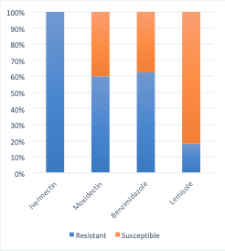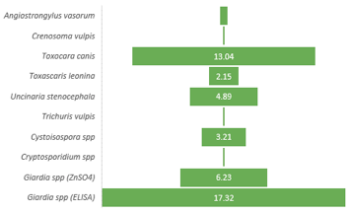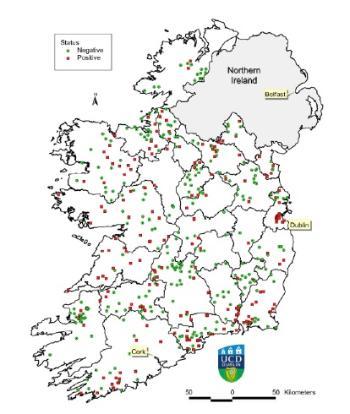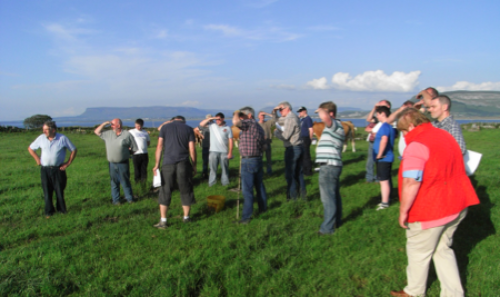One Health
Research Group: The Sustainable Control of Animal Parasites
Parasites are truly fascinating organisms. Through millions of years of evolution, they have developed the ability to live and replicate within their host and have developed strategies to survive in the environment. Infection by parasites is one of the main reasons why young ruminants at grass fail to thrive during their first grazing season.  (Fig 1: Efficacy of different anthelmintic drugs in cattle in Ireland)
(Fig 1: Efficacy of different anthelmintic drugs in cattle in Ireland)
Our research focusses mainly on understanding the complex epidemiology of parasites in farm and companion animals and how we can use this knowledge to best control them. A particular focus of our research has been on the development of resistance in helminth parasites to the drugs that are used to control them. We use both in vitro-, such as the faecal egg count reduction test, and in vivo- tests such as the larval development test and the larval migration inhibition test to assess the efficacy of the different classes of antiparasitic drugs. A number of surveys were completed recently on the efficacy of anthelmintic drugs in sheep, horses and more recently in cattle, showing that anthelmintic resistance is widespread, and that future control of these parasites will be more challenging.  (Fig 2: Prevalence of endoparasites found in stray dogs (n=672) in Dublin, Ireland)
(Fig 2: Prevalence of endoparasites found in stray dogs (n=672) in Dublin, Ireland)
We also study the epidemiology of lungworm, Angiostrongylus vasorum, in foxes in Ireland as well as the prevalence of gastrointestinal parasites in companion animals. (Fig 3: Geographical distribution showing the outcome of fox samples screened for Angiostrongylus vasorum)

Our group enjoys good collaborative relationships with many other parasitology groups in Ireland and internationally.
Our group is an active player in the Irish Society for Parasitology and World Association for Advancement of Veterinary Parasitology (WAAVP). We participate in the Livestock Helminth Research Alliance (LiHRA) and Combatting Anthelmintic Resistance in Ruminants (COMBAR) Cost Action and contribute to the Parasite Control Technical Working Group of Animal Health Ireland. We also participate in the European Scientific Counsel for Companion Animal Parasites ((opens in a new window)ESCCAP).
Research Team
Faculty
Theo de Waal
Grace Mulcahy
Annetta Zintl
Technical Staff
Amanda Lawlor
Post-Doc
Nagwa Elghryani
PhD Students
Anne Kelleher
Kyra Hamilton
Undergraduate Veterinary Students
(Image below: Field walk with farmers – parasite control)
